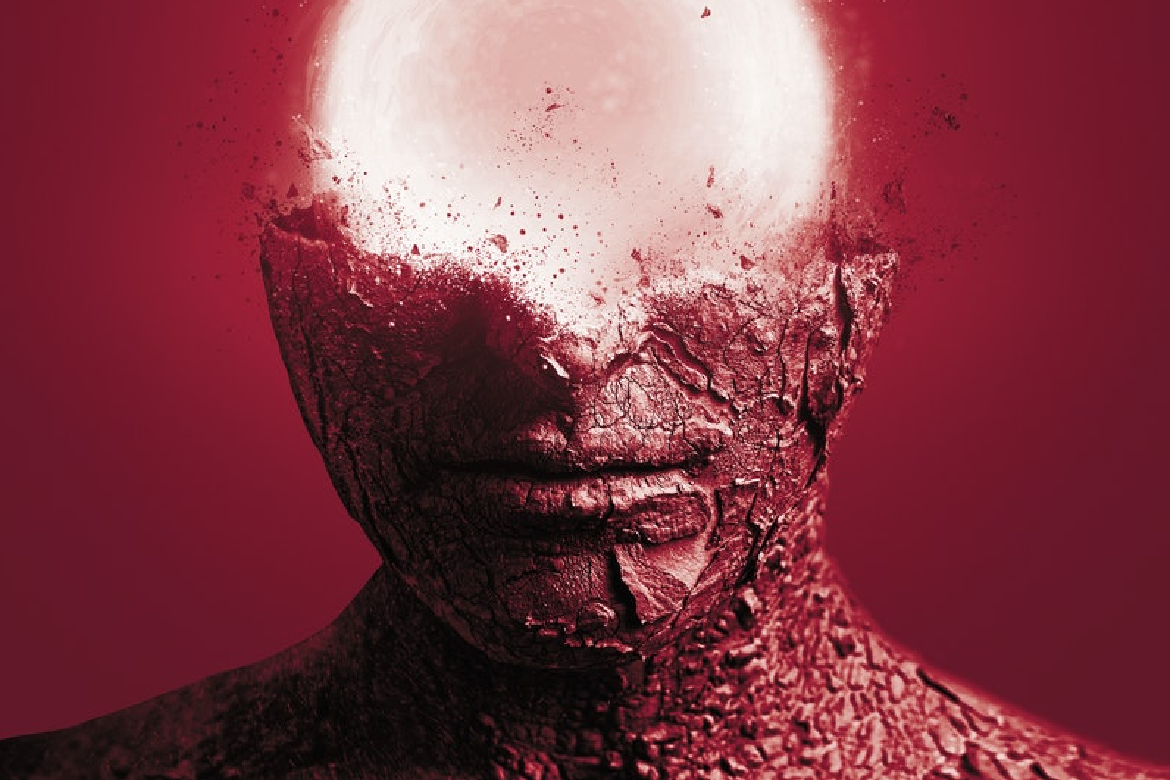“Now the scenery spins, fading in and out of view.“
The pandemic-induced lockdowns of yesteryear were a tumultuous and trying time for many — live music quickly became a distant memory and uncertainty ran rife through the industry as artists and bands could no longer promote through traditional, personal means. Some though, including The Uncharted frontman Arron Luke Carter, found strength in the solace of lockdown. Penned during a major transitional period in Carter’s story so far, the ambitious eight-track debut LP DIS(INTEGRATION) is an intimate exploration of life’s greatest and most relatable challenges — the conflicting emotions of love and loss, of acknowledging the need to move on after losing oneself, of chasing escapism, of retaining hope for the future when crippling self-doubt sets in.
Opening track and lead single “Light & Shadow” wastes no time in showcasing Arron’s arsenal of awe-inspiring talents. Fusing progressive, grandiose guitar licks with soaring, operatic vocals from the offset, the songwriting on show exudes promise and is a strong statement to listeners that although this is a debut project, the musicianship on show is incredibly polished. Lyrically, “Light & Shadow” intentionally toys with dichotomy throughout, with standout lines like “As our scars align we’ll come to find / The light and shadow have eroded us, erased our spark / Divided us between the heart / Between our hurts.”
“Opposing Hearts” further builds upon Arron’s exploration of dualism — this heartfelt track dives into a narrative between two people, one of whom believes life is worth living whilst the other does not. Echoing early TesseracT in its instrumentation and vocal stylings, “Opposing Hearts“ is melancholic, mercurial and meandering; there’s a lot to digest and enjoy here for prog lovers. Across DIS(INTEGRATION)’s opening quarter, Arron’s influences echo through his capacious vocal range. From highly distinguished vocalists Darroh Sudderth, Maynard James Keenan, and Mike Patton to classic metal frontmen Rob Halford and Bruce Dickinson, there’s a rich historical influence interwoven through Arron’s performance, which lends the record so much depth and maturity.
Fourth track “Temporal” is a stellar standout song on DIS(INTEGRATION); Arron delightfully hybridises stylistic songwriting styles from Between The Buried And Me and Our Hollow, Our Home to create something that sounds like both, yet neither simultaneously. This track is outstandingly refreshing, with a floaty, astral presence throughout that adds enormous gravity to the overall composition. And don’t even get me started on how downright sexy the guitar solo is. Lyrically, “Temporal“ is an absolute juggernaut, too. Its chorus is as contagious as it is captivating: “Face to face with all my doubts, I drift in the unknown / Looking for an escape from this ordinary world.” With “Temporal“, Arron explores the paralysis of fear one naturally feels when confronted with self-doubt and the paradoxical freedom that comes with anxiety. This is most evident in the second verse — “The anxiety that lies beneath ripples outward and pulls me under / Staring at this new abyss / The dizziness of freedom calls me.”
As we enter DIS(INTEGRATION)’s second half, the atmosphere of the record noticeably darkens, mirroring the theme of duality that permeates each and every track thus far. Title track “Disintegration” is a deeply emotive, dystopian-sounding ballad replete with some gorgeous guitar-work echoing progressive rock hypergiants King Crimson and Pink Floyd. The argument could be made that “Disintegration“ slows the album’s midpoint pacing down considerably. However, “Disintegration” is a little on the shorter side by Arron’s standards (the songs on DIS(INTEGRATION) average out as a meaty five-and-a-half minutes), and this feels like a fitting transitional track in the context of the record’s overarching narrative.
“Myopia” swings in seventh on the tracklist, and is DIS(INTEGRATION)’s most maniacal, crushing track, with some hefty riffwork constantly teetering on the edge of a breakdown throughout. Contrasting these chunky guitar chugs are some jaw-dropping falsetto passages delivered faultlessly by Arron, culminating in an emphatic, explosive penultimate instrumental section before looping back to a fourth and final verse. This creates a sense of unease and suspense as we head into the big one: track eight. Clocking it at almost seven minutes, closer “Integration” is a sprawling, labyrinthian and convoluted composition that reunites all of the record’s key themes into one monster of a track. Glitchy, shadowy synths linger unsettlingly alongside driven guitars, providing menace and momentum to the song, whilst soaring singalong passages convey “Integration“’s message of becoming whole with oneself. It is here where Arron’s sound is closest to the likes of The Contortionist’s debut record Exoplanet, and I can’t express quite how complimentary that is.
Ultimately, Arron Luke‘s debut album is an investable vision, one that is wonderfully executed and emotionally profound. With eight tracks across its forty-three minute runtime, it is a fairly dense progressive metal record, which certainly serves as a double-edged sword, as many may need a few repeat listens to truly digest and understand what this record is. Allow me to summarise though — DIS(INTEGRATION) is remarkably relatable, mature beyond its years, oozing with promise, and is a gemstone amongst a crown of British progressive metal records.
9/10
DIS(INTEGRATION) by Arron Luke will be released on Friday, 29th July. Follow Arron Luke on Spotify here, and stream the album when it drops. For more on progressive metal and music in general, stick with us at Boolin Tunes.

